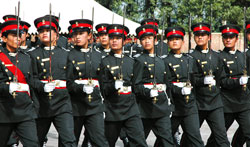 MIN RATNA BAJRACHARYA |
As the election results call for a consensus among parties, it is impossible for the Maoists to hold both the post of prime minister with executive powers and of president, who will be the supreme commander of the army.
The NC is steadfast in its stance on making Koirala the president of the country. The party highly regards Koirala's contribution in bringing the peace process into this situation and would rather like to stay in opposition if he is not given the post of president.
A senior military officer says the army also has not accepted the proposal of Koirala as the supreme commander-in-chief. It seems they want a non-political person as president, believing that a politically neutral person will not interfere in their affairs.
People had never expected that the chief of army staff Rukmangud Katuwal, who had close relations with the deposed king, would accept the declaration of a republic. The reason was the Indian message to the king suggesting he make a graceful exit. It is believed that Gyanendra was well aware of this fact, as a result of which the republic was implemented without bloodshed.
A national security council has been formed which has not met even once. The military apparatus has been run entirely by the prime minister and the army chief for the last two years. "Earlier it was the palace that would control the army, but now there is nothing to control it," said an officer on condition of anonymity.
Senior army officers claim the size of the Nepali army was reduced drastically in the name of restructuring, soon after democracy was introduced in 1951 under the leadership of Nepali Congress. It was done because India wanted it. Officers argue that India planed it as a military strategy to weaken the Nepali army.
Maoist leader Barshaman Pun (Ananta) says: "It is natural that foreign activities tend to thrive during the transition period but we must be able to utilise them for the national interest." He says Nepali politicians blame foreign hands if the situation is not favourable or consider it an impact of globalisation if the situation is favourable to them.
Military analysts argue that besides Indian influence, there has been American influence on the Nepali army quite recently, especially on counter-terrorism and staff training.
If the vacuum created by the ending of royal patronage is not filled, it could lead to disaster. It is important to keep the military structure intact, otherwise the long wait for a political decision on military patronage could upset the army.
Political analyst Hari Sharma says: "Today's main challenge is the lack of a constitutional civil mechanism to direct the military command." He argues that a clear national security policy is the need of the hour.


